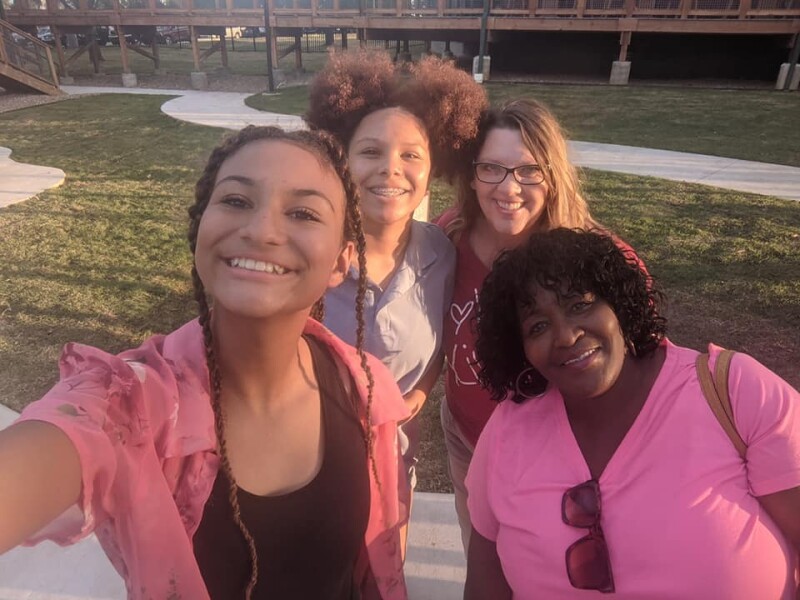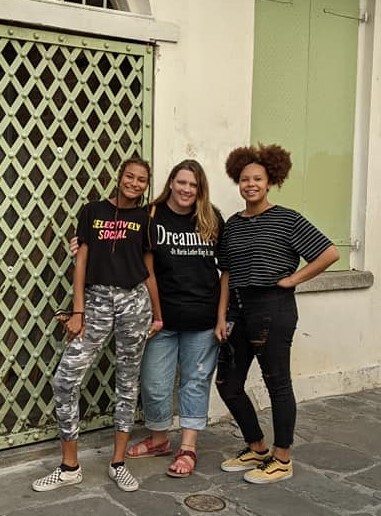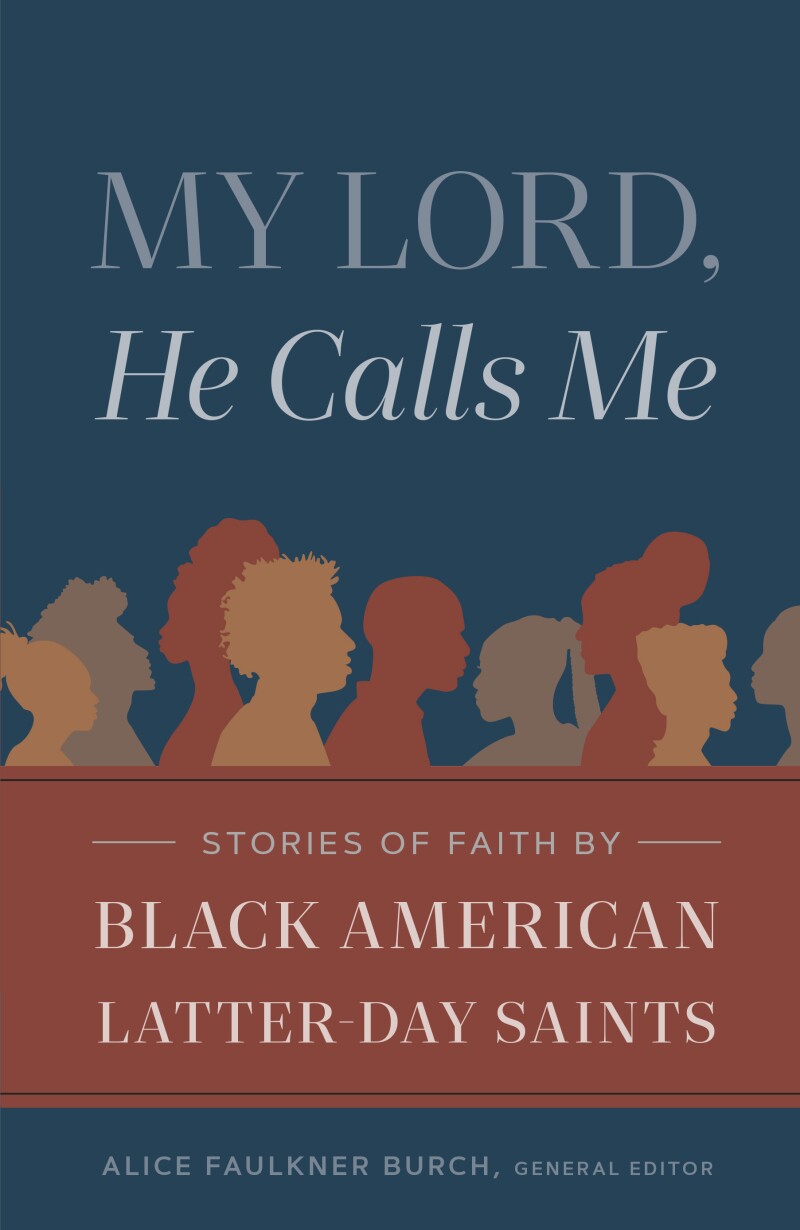We are Hayley and Millie Fletcher. We are Black, adopted members of The Church of Jesus Christ of Latter-day Saints. We live in an area dominated by White culture. We are both biracial—our birth moms are White, and our birth dads are Black. Being the only brown faces at church and school is not easy. Just being teenage girls is not easy, especially if you are tall, brown, and have huge hair. Most girls our age just want to fit in, but for us that’s impossible. We stand out and are forced to stand up. Being different makes us tough; it makes us sensitive; it makes us powerful when we tell our stories.
Some days we get tired. People touch our hair, ask us if we play basketball, and assume that our birth moms were on drugs. We have heard and been called the N-word more times than we can count, and our family has experienced racism in many ways since our arrival. When things get really tough, we talk about Jesus: how He treated others and the type of person that He was. In our eyes, Jesus is more like us than most people realize. His skin was probably brown because He was a Jew from the Middle East. He was adopted because Joseph was not His biological father. He stood out and was different in who He was and the things that He taught. Jesus was cool! He loved everyone and set the perfect example of how we should love each other and appreciate our differences. Jesus loved to be different.
In October 2020, after months of homeschool, quarantine, and racial tension, our mom put us in the car, and we drove five thousand miles across the country to learn more about our roots, our history, and Jesus. Mom called it our find-our-roots-and-Jesus road trip. We called it our Mom-may-be-having-a-nervous-breakdown road trip. Either way, our focus turned to the road and our Savior. We found Jesus along the way, with family, friends, historical heroes, and strangers. Let’s just say that we belted the song “Jesus Take the Wheel” throughout our trip; it was hilarious. It was our theme song. We left with tears and big plans to find some peace. We hoped the voices of the past would teach us about the future. Throughout the trip we read the New Testament. We learned about Jesus’s life and mission. We found His love and compassion through others in our studies and as we toured historic civil rights movement sites across the country.

Our first visit was to Millie’s Grandma V in Oklahoma. Our mom took us to Grandma V because she could tell us things and could relate to our issues with racism because she’s a Black woman. Our mom loves us, but she also knows that because she is White, she will never understand everything we go through. Grandma V talked to us about being strong, Black women. She talked about her own experiences with racism and her daily struggles to live with bias and ignorance. She not only understood our trials—she was living them. We spent the night in Grandma V’s home, and on Sunday morning we found Jesus at the Corinth Baptist Church, which we attended with her. We shouted praise, listened to an amazing pastor, and rocked the world with music and song. After church we stood in her driveway and prayed together. Then we tearfully hugged goodbye and turned our car toward Mississippi.
Our next visit was to the home of Medgar Evers in Jackson, Mississippi. We sat outside his home and talked about his murder and about his wife, Myrlie, and their little children who had found him in his driveway. It was quiet in our car as our mom told us his story. We learned about sacrifice, determination, and purpose.
Jesus taught the people that to follow Him meant denying self and taking up their cross (see Luke 9:23). He said: “For whosoever will save his life shall lose it: but whosoever will lose his life for my sake, the same shall save it” (Luke 9:24). Mr. Medgar did as Jesus asked. He took up the “cross” of civil rights, working to improve life for others, like Jesus did. Though Mr. Medgar’s reward from Jesus wasn’t received in this life, surely in the next Jesus will remember him and bless him for his work. Like Jesus’s, Mr. Medgar’s mission and life were short, and like Jesus’s, his legacy has lived on.
As we drove at night across Mississippi, we learned about Mamie Till and her son Emmett. Emmett was our age when he was murdered by some White men for something he didn’t do. As we drove, the roads were dark and rainy, and we traveled over bridges similar to the one young Emmett was tossed off of. Ms. Mamie was so strong. She is one of our mom’s heroes. Ms. Mamie sacrificed her own grief and trauma to open her son’s casket to let the world see her son and what racial hatred had done to him. Her decision literally changed the course of the civil rights movement. Jesus’s mom, Mary, must have felt like Ms. Mamie. Jesus didn’t deserve to die either, and Mary also stood by Him following His death. This made us realize once again that because Jesus died for us, we will all live again. Emmett and Ms. Mamie will as well.
Like so many prophets and heroes of the scriptures, we don’t always see the results of our actions. Abinadi didn’t know that Alma was even listening, and he later changed the lives of so many as a faithful prophet (see Mosiah 11–17). The same was true for Ms. Mamie. Little did she know at the time that another powerful lady, Rosa Parks, saw her strength and was inspired. Three months later, Ms. Rosa took a seat on a bus and contributed to the civil rights movement to change our country for the better.
We found Jesus in New Orleans on the steps of the school Ruby Bridges attended. Our feet climbed the same steps, and we took photos in front of her school. Ruby’s experience reminded us of Jesus. How many angry crowds did Jesus endure? But He kept His head up and kept walking. We have also endured racism in school, and just like Ruby we also deserve an education.
During our trip, we laughed and we cried and we talked about important things. We talked a lot about Jesus and learned that He understands us because He endured similar situations. We visited historic places of our Black ancestry. We reflected on the shores of New Orleans, where enslaved persons were dragged from ships, chained and helpless. Like them, Jesus had been bound and taken. Like our enslaved ancestors, He was beaten and mocked. Jesus didn’t deserve that horrible treatment, and neither did our ancestors. He suffered for those who were forced onto the auction blocks of New Orleans; He knew their suffering and struggles (see Mark 15:15–21).

We found ourselves in Montgomery, Alabama, on the steps of the Dexter Avenue King Memorial Baptist Church, Martin Luther King Jr.’s first church. We sat on the church steps and talked about his mission, his family, and how we recognized part of Jesus in the way that Dr. King lived. Like Jesus, Dr. King spent his life preaching to people to follow God, love others, and become united. As we continued our journey, we followed Dr. King to Florida, into Georgia, and lastly to Memphis, Tennessee, to the Lorraine Motel, where he was killed. By the time we reached Memphis, Dr. King was like a friend to us. We had listened to his speeches, stood in front of his homes, and marched where he had marched. We asked ourselves why anyone would kill someone so young, so motivational, and so important to this world. We sat in front of the hotel where he died, and our thoughts turned to our Savior; we asked the same questions. Jesus was also young, powerful, and full of hope. He taught us to love each other and to endure every hardship that comes our way. He suffered equally for everyone no matter their race, religion, or location.
When we finally pulled back into our own driveway, we were different people. We had new knowledge, determination, and hope. We had walked on sacred ground. We had been inspired by countless people and their stories. Most importantly, we had found Jesus and knew Him better than we had before our trip.
We’ve thought so much about our road trip across the country. We’ve thought a lot about the road we have been asked to travel as Black girls in America. All roads have twists and turns. All roads have dips and crashes. All roads are more difficult to travel when alone. In the end, Jesus remains our best travel companion and our great tour guide. He has taught us to follow the map He has made for us. He is the Way, the Truth, and the Life (see John 14:6), and that’s better than any GPS system we could ever buy.
Sometimes we learn the most on the unlit roads, the lonely stretches of travel, and the journeys that dip into the past but guide us into the future. We pray that people will learn that diversity is good, that racism is an awful sin, that Jesus loves us all because we are part of His beautiful family, and that we are all created in His image with great purpose. We can find Him anywhere in this world if we just take the time to look.
My Lord, He Calls Me
Hayley Fletcher is fourteen years old. She enjoys the performing arts and has been involved in several plays. She loves to sing, act, and listen to music and audiobooks. Hayley is a great student and friend; she always finds ways to involve others. She loves anything chocolate.
Millie Fletcher is thirteen years old. She is very athletic and excels in several sports, including basketball and volleyball. Millie is sensitive and outgoing and makes sure everyone around her is included. Millie enjoys animals, especially horses. She loves music, dancing, and making videos. The sisters live in Utah with their parents.
▶You may also like: Why this editor says a new compilation of Black Latter-day Saint testimonies is a gift for all


